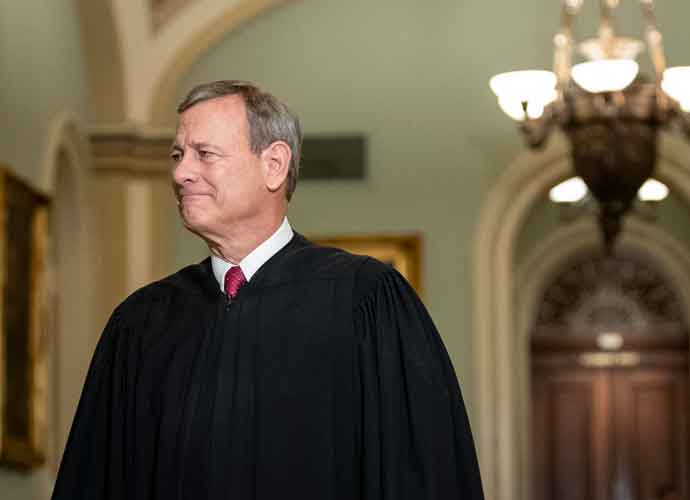

WASHINGTON, DC JANUARY 16: Supreme Court Chief Justice John Roberts arrives to the Senate chamber for impeachment proceedings at the U.S. Capitol on January 16, 2020 in Washington, DC. On Thursday, the House impeachment managers will read the articles of impeachment against President Trump in the Senate chamber and the chief justice of the Supreme Court and every senator will be sworn in. (Photo by Drew Angerer/Getty Images)
On Thursday, the Supreme Court heard arguments on an unprecedented election case over former President Donald Trump’s eligibility to be listed on primary ballots in Colorado.
Colorado blocked Trump from its primaries by citing section three of the 14th Amendment of the U.S. Constitution, which dictates that those who have engaged in “insurrection or rebellion” can not hold federal office.
Maine has similarly blocked Trump from its ballot.
On December 19, 2023, the Colorado Supreme Court found “clear and convincing evidence that Donald Trump engaged in insurrection,” making him ineligible to stand in an election. His lawyers in Colorado argued that Trump should not be disqualified because he held no responsibility for “the riot,” careful not to refer to the events of January 6 as an insurrection. The state’s decision was appealed by Trump’s team, sending it to the Supreme Court.
Subscribe to our free weekly newsletter!
A week of political news in your in-box.
We find the news you need to know, so you don't have to.
In Maine, due to its state constitution, the decision to ban Trump from the ballot fell to the top electoral official, Secretary of State Shenna Bellows (D-Maine). She ruled Trump was ineligible due to section three, citing that in the lead-up to January 6, Trump “used a false narrative of election fraud to inflame his supporters and direct them at the Capitol.”
Due to his appeal, Trump’s name will remain on the ballot in both states pending the ruling from the Supreme Court.
Supreme Court judges from both sides of the political spectrum showed skepticism regarding the Colorado case. Questions focused mostly on whether it was up to states to enforce this particular constitutional provision, and not whether Trump committed an act of insurrection.
Chief Justice John Roberts asked, “The whole point of the 14th amendment was to restrict states’ power, right?” Highlighting the fact that the amendment was passed to limit the power of Confederate states after the Civil War.
Justice Elana Kagan said, “I think the question you have to confront is why a single state should decide who gets to be president of the United States.”
The judges also ruminated on the national effects a ruling for Colorado in the case would have. Justice Samuel Alito said states reaching separate rulings on the issue would lead to an “unmanageable situation.”
Roberts predicted that if Colorado’s ruling was upheld it would lead to states kicking candidates off the ballot at a whim, saying. “That’s a pretty daunting consequence.”
There is no deadline for the ruling, but experts expect a judgment to be issued before Super Tuesday on March 5, when most states hold their primaries.
President Donald Trump has nominated a former right-wing podcaster to lead a federal watchdog agency.…
The Trump Organization, President Donald Trump’s holding company for his investments and business ventures, has…
Democratic lawmakers have criticized President Donald Trump for issuing a precision strike on Iranian nuclear…
Following the Sunday strikes on three of Iran's nuclear facilities by the U.S., world leaders…
On Sunday, the U.S. military bombed Iran's Fordo, Natanz and Isfahan nuclear facilities. Pentagon officials…
Florida Gov. Ron DeSantis said Floridians have the right to drive into crowds of protestors…